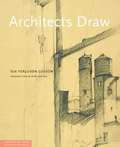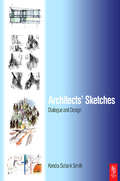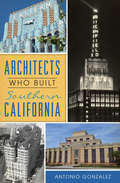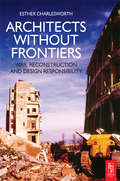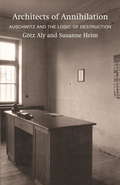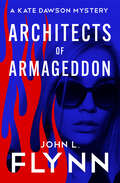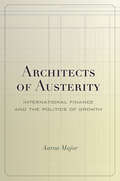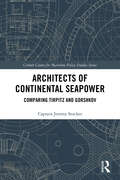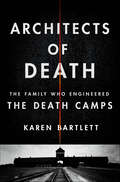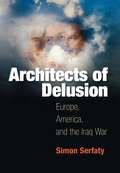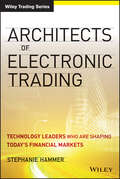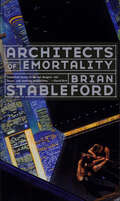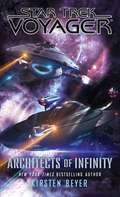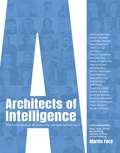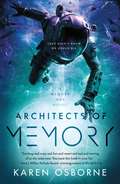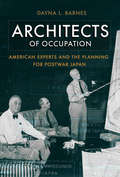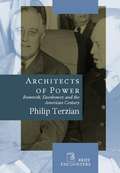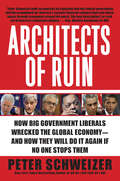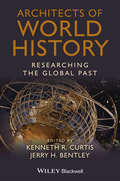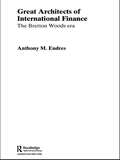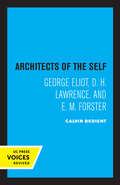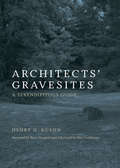- Table View
- List View
Architects Draw
by Sue Ferguson GussowArchitects Draw, the inaugural volume of the Architectural Brief series, translates much-loved Cooper Union professor and artist Sue Gussow's freehand drawing class into a portable tool for teachers and students in professional architecture programs. After a foreword by the noted critic Dore Ashton, Part I sets forth a complete syllabus for a foundational freehand drawing program. Part II includes a discussion of pedagogical philosophy and Part III illustrates how freehand drawing is carried into professional, postgraduate life.
Architects Sketches
by Kendra Schank SmithConcepts from architects’ minds evolve through sketches and as a mode of transference are conveyed to the finished building. This book compares qualities of sketches to reveal unique approaches to the instruments of thinking in which all architects engage. It provides new insight into the relationship between architectural sketches and the process of creative manipulation. Sketches comprise a thinking mechanism, and through the qualities of ambiguity, quickness and change, they initiate a dialogue for architects. As a medium to facilitate communication, recording, discovery and evaluation, their pertinence lies in their ability to exhibit both the precise and the imprecise. Exploring four related theoretical approaches, play, memory-imagination-fantasy, caricature and the grotesque, the book shows how imprecision stimulates imagination to conceive new forms in the dialogue of architectural sketches.
Architects Who Built Southern California
by Antonio GonzalezIn the early 1900s, the population of Southern California exploded, and the cities grew at such a rapid pace that builders could hardly keep up. Among those who settled in the area were ten architects looking to make their marks on the world. Claud Beelman, a man who never received a college degree, would go on to design the Elks Lodge in Los Angeles. Albert C. Martin, architect of Grauman's Million Dollar Theater, founded a company that is still going strong more than one hundred years later, and Julia Morgan, the first woman architect licensed in California, was hired by William Randolph Hearst to design the Examiner Building. Join author Antonio Gonzalez as he tells the stories of the people behind some of Southern California's most iconic buildings.
Architects Without Frontiers
by Esther CharlesworthFrom the targeted demolition of Mostar’s Stari-Most Bridge in 1993 to the physical and social havoc caused by the 2004 Boxing Day Tsunami, the history of cities is often a history of destruction and reconstruction. But what political and aesthetic criteria should guide us in the rebuilding of cities devastated by war and natural calamities? The title of this timely and inspiring new book, Architects Without Frontiers, points to the potential for architects to play important roles in post-war relief and reconstruction. By working “sans frontières”, Charlesworth suggests that architects and design professionals have a significant opportunity to assist peace-making and reconstruction efforts in the period immediately after conflict or disaster, when much of the housing, hospital, educational, transport, civic and business infrastructure has been destroyed or badly damaged. Through selected case studies, Charlesworth examines the role of architects, planners, urban designers and landscape architects in three cities following conflict - Beirut, Nicosia and Mostar - three cities where the mental and physical scars of violent conflict still remain. This book expands the traditional role of the architect from 'hero' to 'peacemaker' and discusses how design educators can stretch their wings to encompass the proliferating agendas and sites of civil unrest.
Architects of Annihilation: Auschwitz and the Logic of Destruction
by Gotz Aly Susanne HeimArchitects of Annihilation follows the activities of the demographers, economists, geographers and planners in the period between the disorderly excesses of the November 1938 pogrom and the fully-effective operation of the gas chambers at Auschwitz in summer 1942. The authors, both journalists and historians, argue that this group of intellectuals, often combining academic, civil service and Party functions, made an indispensable contribution to the planning and execution of the Final Solution. More than that, in the economic and demographic rationale of these experts, the Final Solution was only one element in a far-reaching programme of self-sufficiency which privileged the German Aryan population.
Architects of Annihilation: Auschwitz and the Logic of Destruction
by Gotz Aly Susanne HeimArchitects of Annihilation follows the activities of the demographers, economists, geographers and planners in the period between the disorderly excesses of the November 1938 pogrom and the fully-effective operation of the gas chambers at Auschwitz in summer 1942. The authors, both journalists and historians, argue that this group of intellectuals, often combining academic, civil service and Party functions, made an indispensable contribution to the planning and execution of the Final Solution. More than that, in the economic and demographic rationale of these experts, the Final Solution was only one element in a far-reaching programme of self-sufficiency which privileged the German Aryan population.
Architects of Armageddon (The Kate Dawson Mysteries)
by John L. FlynnA San Francisco detective puts her life on the line to stop a doomsday cult from stoking the fires of Armageddon in this tense thriller.When Det. Kate Dawson is called to investigate a mass murder, she has no idea how grim and disturbing the situation truly is. The charismatic leader of End Times Ministries has ordered his followers to put their own children to death. Many of the followers willingly complied, believing it to be part of God&’s plan. As the Chosen Ones, they are destined to inherit the Earth. And the time has come for them to prepare for a holy war.With murderous fanatics hell-bent on starting Armageddon, Kate knows she must find the diabolical mastermind behind their horrifying crusade. But as San Francisco descends into violent chaos, and the Doomsday clock ticks closer to midnight, it may be too late to stop an apocalyptic plot already in motion.
Architects of Austerity: International Finance and the Politics of Growth
by Aaron MajorArchitects of Austerity argues that the seeds of neoliberal politics were sown in the 1950s and 1960s. Suggesting that the postwar era was less socially democratic than we think, Aaron Major presents a comparative-historical analysis of economic policy in the United States, the United Kingdom, and Italy during the early 1960s. In each of these cases, domestic politics shifted to the left and national governments repudiated the conservative economic policies of the past, promising a new way forward. Yet, these social democratic experiments were short-lived and deeply compromised. Why did the parties of change become the parties of austerity? Studies of social welfare policy in these countries have emphasized domestic factors. However, Major reveals that international social forces profoundly shaped national decisions in these cases. The turn toward more conservative economic policies resulted from two critical shifts on the international stage. International monetary organizations converged around an orthodox set of ideas, and a set of institutional transformations within the Bretton Woods system made the monetary community more central to financial management. These changes gave central banks and treasuries the capacity to impose their ideas on national governments. Architects of Austerity encourages us to critically consider the power that we vest in public financial authorities, which have taken on an ever larger role in international economic regulation.
Architects of Change: Designing Strategies for a Turbulent Business Environment
by Jeremy GhezWhat is the difference between a fire fighter and an architect? One deals with crises as they arise while the other is capable of building something that can withstand all weathers. Using this analogy, Architects of Change provides you with the tools to grasp, leverage and harness the dynamics that shape tomorrow's markets. It encourages you to nurture an entrepreneurial mind-set to transform the way a business – or even an entire industry – operates. Tackling crucial topics related to geopolitics, creative destruction, fake news, resilience and creativity, this book gives you the tools to analyse your environment and future trends in order to reinvent the way you do business. It teaches you how to: · Identify actors of change · Conduct simulations about the future · Assess threats of political instability · Build a strategy for a profitable and sustainable firm amid ongoing uncertainty · Become an architect of change yourself. Containing original interviews with industry insiders, including a world-famous expert on brands and luxury, the former CEO of a major think tank, a thought leader from CISCO, the former chairman of the US National Intelligence Council, and a former chief political scientist of a large Asian bank, this book helps you to understand the type of imagination and creativity this business environment requires not only to survive, but thrive.
Architects of Continental Seapower: Comparing Tirpitz and Gorshkov (Corbett Centre for Maritime Policy Studies Series)
by Jeremy StockerThis book describes and analyses two iconic figures in twentieth-century naval history: the German Admiral Alfred von Tirpitz and the Russian Admiral Sergei Gorshkov. It examines the men, what they thought and wrote about seapower, the fleets they created and the strategic consequences of what they did. More broadly, it draws on the respective histories of the post-1897 Imperial German Navy and the post-1956 Soviet Navy to examine the continental bid for large-scale seapower. The work argues that both individuals built navies that did not, and could not, fulfil the objectives for which they were created. Drawing on the legacies of both men, the book also develops some wider ideas about the creation of large navies by continental states, with cautionary lessons for today’s emerging powers, India and China. Both admirals have received book-length biographies, but this is the first attempt at a comparative study and the first to draw broader strategic lessons from their respective attempts as continental navalists to challenge maritime states. This book will be of much interest to students of naval history, strategic studies and International Relations.
Architects of Death: The Family Who Engineered the Death Camps
by Karen BartlettA sobering story of an industrial family’s cold efficiency behind the design of the ovens at AuschwitzArchitects of Death tells the astonishing story of how the gas chambers and crematoria that facilitated the murder and incineration of more than one million people in the Holocaust were designed not by the Nazi SS, but by a small respectable family firm of German engineers. Topf and Sons designed and built the crematoria at the concentration camps at Auschwitz-Birkenau, Buchenwald, Belzec, Dachau, Mauthausen, and Gusen. At its height, 66 Topf triple muffle ovens were in operation—46 of which were at Auschwitz. These were not Nazi sadists, but men who were playboys and the sons of train conductors. They were driven not by ideology, but by love affairs, personal ambition, and bitter personal rivalries. Even while their firm created the ultimate human killing and disposal machines, their company sheltered Nazi enemies from the death camps. The intense conflagration of their very ordinary motives created work that surpassed in inhumanity even the demands of the SS. But the company that achieved this spectacularly evil feat of engineering typify the banality of evil. In the 1930s their family firm produced apparatus for all sorts of industries—baking, brewing, the firing of ceramics. Ovens for crematoria accounted for only a small proportion of their business, but it is for these that the Topf brothers became infamous. Their name can still be seen stamped on the iron furnaces of Auschwitz.
Architects of Delusion
by Simon SerfatyThe commencement of war in Iraq in 2003 was met with a variety of reactions around the globe. In Architects of Delusion, Simon Serfaty presents a historical analysis of how and why the decision to wage war was endorsed by some of America's main European allies, especially Britain, and opposed by others, especially France and Germany.Tony Blair, George W. Bush, Jacques Chirac, and Gerhard Schroeder were, Serfaty argues, the architects of one of the most serious crises in postwar transatlantic relations. These four heads of state were the victims not only of their personal delusions but also of those of the nations they led. They all played the hand that their countries had dealt them--the forceful hand of a righteous America, the principled acquiescence of a faithful Britain, the determined intransigence of a quarrelsome France, and the ambiguous "new way" of a recast Germany.Serfaty's deft interweaving of the political histories and cultures of the four countries and the personalities of their leaders transcends the Europe-bashing debate sparked by the Iraq invasion. He contends that not one of these four leaders was entirely right or entirely wrong in his approach to the others or to the issues, before and during the war. For the resulting wounds to heal, though, and for the continuity of transatlantic relations, he reminds us that the United States and France must end their estrangement, France and Britain must resolve their differences, Germany must carry its weight relative to both France and Britain, and the United States must exert the same visionary leadership for the twenty-first century that it showed during its rise to preeminence in the twentieth century.
Architects of Electronic Trading
by Stephanie Hammer Michael KuhnInsights that can help you improve your technology edgeFeaturing contributions from technology visionaries at leading alternative investors, hedge funds, trading firms, exchanges, and vendors, this book covers current trends in trading technology. The book features interviews with the leaders responsible for the technology that is shaping today's electronic financial markets. You'll hear the views of CIOs, CTOs, and other technology leaders on emerging technologies, innovation in the financial sector, and how technology is enhancing markets in ways other than just speed. Their perspectives on harnessing technology to enhance computing power, reduce time to market, bolster risk management, and much more offer valuable lessons for readers.Includes a wealth of practical insights on how to improve your technology edgeFeatures interviews with leading technology professionals in the financial industry across an array of asset classes and marketsServes as a topical guide to the latest developments, enhancements and applications of technology to tackle trading and risk management challengesIncludes insights from top technology professionals on evaluating and adopting technology solutionsLooks at the effects of technology on finance professionals and their businesses as well as the global finance industry generally
Architects of Emortality
by Brian StablefordBrian Stableford launched an ambitious future history series with Inherit the Earth, to widespread praise. "Stableford has created in this novel a totally believable world, and wrapped it around a series of mysterious events, surprise revelations, double crosses, confused motivations, rumors, lies, plots, and counterplots. . . . Tightly controlled and suspenseful throughout," said Science Fiction Chronicle. Library Journal said, "The ethical questions posed by the prospect of conquering the aging process underscore this fast-paced SF adventure, adding depth to a story that will appeal to fans of high-tech SF and conspiracy theories." This future world is a complex society obsessed with the technology of life extension and on the brink of creating true immortals.Now, in Architects of Emortality, Stableford gives us a story set hundreds of years in the future, filled with people who can hope for 300-year lifespans and a fortunate few whose lives will be in the thousands of years. This society is on the edge of radical change, where people have the time to develop eccentric lifestyles and personal obsessions, a world sometimes reminiscent of the distant future of Michael Moorcock's Dancers at the End of Time series. And there has been a series of murders that threaten the future stability of the world, murders executed by bioengineered flowers. Police officers Watson and Holmes investigate, but the central figure quickly becomes the amateur detective Oscar Wilde, a student of history who has taken on the persona of his namesake. And the question is not so much who the murderer is, but how and why.Filled with memorable characters and powerful and striking images of the richly altered world of the future, Architects of Emortality is a satisfying and complete story that also adds depth and detail to the evolving series.At the Publisher's request, this title is being sold without Digital Rights Management Software (DRM) applied.
Architects of Infinity (Star Trek: Voyager)
by Kirsten BeyerAn original novel set in the universe of Star Trek: Voyager, from the New York Times bestselling author!As the Federation Starship Voyager continues to lead the Full Circle Fleet in its exploration of the Delta Quadrant, Admiral Kathryn Janeway remains concerned about the Krenim Imperium and its ability to rewrite time to suit its whims. At Captain Chakotay's suggestion, however, she orders the fleet to focus its attention on a unique planet in a binary system, where a new element has been discovered. Several biospheres exist on this otherwise uninhabitable world, each containing different atmospheres and features that argue other sentient beings once resided on the surface. Janeway hopes that digging into an old-fashioned scientific mystery will lift the crews' morale, but she soon realizes that the secrets buried on this world may be part of a much larger puzzle—one that points to the existence of a species whose power to reshape the galaxy might dwarf that of the Krenim. Meanwhile, Lieutenants Nancy Conlon and Harry Kim continue to struggle with the choices related to Conlon’s degenerative condition. Full Circle’s medical staff discovers a potential solution, but complications will force a fellow officer to confront her people’s troubled past and her own future in ways she never imagined… ™, ®, & © 2018 CBS Studios, Inc. STAR TREK and related marks and logos are trademarks of CBS Studios, Inc. All Rights Reserved.
Architects of Intelligence: The truth about AI from the people building it
by Martin FordFinancial Times Best Books of the Year 2018 TechRepublic Top Books Every Techie Should Read Book Description How will AI evolve and what major innovations are on the horizon? What will its impact be on the job market, economy, and society? What is the path toward human-level machine intelligence? What should we be concerned about as artificial intelligence advances? Architects of Intelligence contains a series of in-depth, one-to-one interviews where New York Times bestselling author, Martin Ford, uncovers the truth behind these questions from some of the brightest minds in the Artificial Intelligence community. Martin has wide-ranging conversations with twenty-three of the world's foremost researchers and entrepreneurs working in AI and robotics: Demis Hassabis (DeepMind), Ray Kurzweil (Google), Geoffrey Hinton (Univ. of Toronto and Google), Rodney Brooks (Rethink Robotics), Yann LeCun (Facebook) , Fei-Fei Li (Stanford and Google), Yoshua Bengio (Univ. of Montreal), Andrew Ng (AI Fund), Daphne Koller (Stanford), Stuart Russell (UC Berkeley), Nick Bostrom (Univ. of Oxford), Barbara Grosz (Harvard), David Ferrucci (Elemental Cognition), James Manyika (McKinsey), Judea Pearl (UCLA), Josh Tenenbaum (MIT), Rana el Kaliouby (Affectiva), Daniela Rus (MIT), Jeff Dean (Google), Cynthia Breazeal (MIT), Oren Etzioni (Allen Institute for AI), Gary Marcus (NYU), and Bryan Johnson (Kernel). Martin Ford is a prominent futurist, and author of Financial Times Business Book of the Year, Rise of the Robots. He speaks at conferences and companies around the world on what AI and automation might mean for the future. Meet the minds behind the AI superpowers as they discuss the science, business and ethics of modern artificial intelligence. Read James Manyika's thoughts on AI analytics, Geoffrey Hinton's breakthroughs in AI programming and development, and Rana el Kaliouby's insights into AI marketing. This AI book collects the opinions of the luminaries of the AI business, such as Stuart Russell (coauthor of the leading AI textbook), Rodney Brooks (a leader in AI robotics), Demis Hassabis (chess prodigy and mind behind AlphaGo), and Yoshua Bengio (leader in deep learning) to complete your AI education and give you an AI advantage in 2019 and the future.
Architects of Memory (The Memory War #1)
by Karen OsborneMillions died after the first contact. An alien weapon holds the key to redemption—or annihilation. Experience Karen Osborne's unforgettable science fiction debut, Architects of Memory.SyFY Wire SFF Reads to pick up in SeptemberTerminally ill salvage pilot Ash Jackson lost everything in the war with the alien Vai, but she'll be damned if she loses her future. Her plan: to buy, beg, or lie her way out of corporate indenture and find a cure. When her crew salvages a genocidal weapon from a ravaged starship above a dead colony, Ash uncovers a conspiracy of corporate intrigue and betrayal that threatens to turn her into a living weapon.At the Publisher's request, this title is being sold without Digital Rights Management Software (DRM) applied.
Architects of Occupation: American Experts and Planning for Postwar Japan
by Dayna L. BarnesThe Allied occupation of Japan is remembered as the "good occupation." An American-led coalition successfully turned a militaristic enemy into a stable and democratic ally. Of course, the story was more complicated, but the occupation did forge one of the most enduring relationships in the postwar world. Recent events, from the occupations of Iraq and Afghanistan to protests over American bases in Japan to increasingly aggressive territorial disputes between Asian nations over islands in the Pacific, have brought attention back to the subject of the occupation of Japan.In Architects of Occupation, Dayna L. Barnes exposes the wartime origins of occupation policy and broader plans for postwar Japan. She considers the role of presidents, bureaucrats, think tanks, the media, and Congress in policymaking. Members of these elite groups came together in an informal policy network that shaped planning. Rather than relying solely on government reports and records to understand policymaking, Barnes also uses letters, memoirs, diaries, and manuscripts written by policymakers to trace the rise and spread of ideas across the policy network. The book contributes a new facet to the substantial literature on the occupation, serves as a case study in foreign policy analysis, and tells a surprising new story about World War II.
Architects of Power
by Philip TerzianThe United States is not a preternaturally inward-looking nation, and isolation is not the natural disposition of Americans. The real question is not whether Americans are prone to isolation or engagement, but how their engagement with the world has evolved, how events have made the United States a superpower, and how these developments have been guided by political leadership. Indeed, the great debates on foreign affairs in American history have not been about whether to have debates on foreign affairs; they have been between the competing visions of American influence in the world.In Architects of Power, Philip Terzian examines two public figures in the twentieth century who personify, in their lives, careers, and philosophies, the rise of the United States of America to global leadership: Franklin D. Roosevelt and Dwight D. Eisenhower. Terzian reveals how both men recognized and acted on the global threats of their time and questions whether America can rise to the same challenges today. Without this clear window into the stricken world that Roosevelt inhabited and Eisenhower understood, we are unlikely to recognize the perils and challenges of the world we have inherited.
Architects of Ruin
by Peter SchweizerWas the financial collapse caused by free-market capitalism and deregulation run amok, as liberals claim? Not on your life, says Peter Schweizer. What we are really witnessing is a massive failure of social engineering by liberals. Architects of Ruin, bestselling author Peter Schweizer describes in riveting detail how a coalition of left-wing activists, liberal politicians, and "do-good capitalists" on Wall Street leveraged government power to achieve their goal of broadening homeownership among minorities and the poor. The results were not only devastating to the economy, but hurt the very people they were supposedly trying to help. The story begins in the 1960s with Saul Alinsky, the legendary Chicago rabble-rouser who trained his acolytes in highly aggressive techniques of community activism. Alinsky's disciples--along with race-baiting activists like Jesse Jackson--seized on the "redlining" controversy of those years to argue that banks were guilty of racial discrimination. In the 1970s, with the help of liberal senators like Ted Kennedy and William Proxmire, legislation was passed that put bankers under the thumb of local activists. In the Clinton years, a new generation of liberal technocrats came to power in Washington and on Wall Street. Schweizer describes how a powerful phalanx of elite liberals, including Bill Clinton, Robert Rubin, Andrew Cuomo, Barney Frank, Chris Dodd, Janet Reno, Deval Patrick, Henry Cisneros, Barack Obama, Nancy Pelosi, Ted Kennedy, Charles Schumer, and many others, aggressively pushed banks to make trillions of dollars in loans to individuals who should never have received them. Meanwhile, Clinton forged a new form of state capitalism in which the big Wall Street financial companies were repeatedly bailed out--with their profits intact--from a series of costly errors, leading them to take ever larger risks. Both financial policies had profoundly distorting effects. The result was the bursting of twin bubbles in mortgages and mortgage-backed derivatives, in turn leading to a global economic collapse. This tale of liberal "Robin Hood capitalism run wild" has never been told. But more than just a story about the past, it is also an urgent warning about the future. For today, the very same people who planted the seeds of the collapse are back in Washington, tasked with cleaning up the mess and determined to use the crisis they caused as cover for a massive overhaul of the American economic system. These people have learned nothing from their past mistakes and are busy applying the same methods to other sectors of the economy--health care, the auto industry, real estate (again!), and above all the promotion of "green" technologies--inflating bubbles that are sure to bring about another crisis. Ordinary Americans who foot the bill for the last state-capitalist bubble have reason to be afraid--very afraid--of the inevitable result.
Architects of Ruin
by Peter SchweizerWas the financial collapse caused by free-market capitalism and deregulation run amok, as liberals claim?Not on your life, says Peter Schweizer. What we are really witnessing is a massive failure of social engineering by liberals.Architects of Ruin, bestselling author Peter Schweizer describes in riveting detail how a coalition of left-wing activists, liberal politicians, and "do-good capitalists" on Wall Street leveraged government power to achieve their goal of broadening homeownership among minorities and the poor. The results were not only devastating to the economy, but hurt the very people they were supposedly trying to help.The story begins in the 1960s with Saul Alinsky, the legendary Chicago rabble-rouser who trained his acolytes in highly aggressive techniques of community activism. Alinsky's disciples--along with race-baiting activists like Jesse Jackson--seized on the "redlining" controversy of those years to argue that banks were guilty of racial discrimination. In the 1970s, with the help of liberal senators like Ted Kennedy and William Proxmire, legislation was passed that put bankers under the thumb of local activists. In the Clinton years, a new generation of liberal technocrats came to power in Washington and on Wall Street. Schweizer describes how a powerful phalanx of elite liberals, including Bill Clinton, Robert Rubin, Andrew Cuomo, Barney Frank, Chris Dodd, Janet Reno, Deval Patrick, Henry Cisneros, Barack Obama, Nancy Pelosi, Ted Kennedy, Charles Schumer, and many others, aggressively pushed banks to make trillions of dollars in loans to individuals who should never have received them. Meanwhile, Clinton forged a new form of state capitalism in which the big Wall Street financial companies were repeatedly bailed out--with their profits intact--from a series of costly errors, leading them to take ever larger risks. Both financial policies had profoundly distorting effects. The result was the bursting of twin bubbles in mortgages and mortgage-backed derivatives, in turn leading to a global economic collapse. This tale of liberal "Robin Hood capitalism run wild" has never been told. But more than just a story about the past, it is also an urgent warning about the future. For today, the very same people who planted the seeds of the collapse are back in Washington, tasked with cleaning up the mess and determined to use the crisis they caused as cover for a massive overhaul of the American economic system. These people have learned nothing from their past mistakes and are busy applying the same methods to other sectors of the economy--health care, the auto industry, real estate (again!), and above all the promotion of "green" technologies--inflating bubbles that are sure to bring about another crisis. Ordinary Americans who foot the bill for the last state-capitalist bubble have reason to be afraid--very afraid--of the inevitable result.
Architects of World History: Researching the Global Past
by Jerry H. Bentley Kenneth R. CurtisArchitects of World History presents an innovative collection of original essays by leading scholars associated with World History, exploring through intellectual autobiography the ideas, challenges, and inspirations that are shaping the field Features original, accessible contributions from pioneering scholars in the field Offers insights into the process of developing a workable world history research topic and the experience of professional life as a world historian. Points to methodological challenges; the scholar’s current research agenda in relation to the development of world history; and future directions anticipated for key areas within world history
Architects of the International Financial System (Routledge International Studies in Money and Banking)
by Anthony EndresWho were the great thinkers on international finance in the mid-twentieth century? What did they propose should be done to create a stable international financial order for promoting world trade and economic growth? This important book studies the ideas of some of the most innovative economists in the mid-twentieth century including three Nobel Laureates; great thinkers who helped shape the international financial system and the role of the World Bank and the International Monetary Fund. Covering the period from the late 1940s up until the collapse of the fixed US dollar-gold link in 1971, the impact of Hansen, Williams, Graham, Triffin, Simons, Viner, Friedman, Johnson, Mises, Rueff, Rist, Hayek, Heilperin and Röpke is assessed. This outstanding book will prove invaluable to students studying international economics, economic history and the history of economic thought.
Architects of the Self: George Eliot, D. H. Lawrence, and E. M. Forster
by Calvin BedientThis title is part of UC Press's Voices Revived program, which commemorates University of California Press’s mission to seek out and cultivate the brightest minds and give them voice, reach, and impact. Drawing on a backlist dating to 1893, Voices Revived makes high-quality, peer-reviewed scholarship accessible once again using print-on-demand technology. This title was originally published in 1972.
Architects' Gravesites: A Serendipitous Guide (The\mit Press Ser.)
by Henry H. KuehnAn illustrated guide to the monumental and non-monumental final resting places of famous architects from Aalto Alvar to Frank Lloyd Wright.All working architects leave behind a string of monuments to themselves in the form of buildings they have designed. But what about the final spaces that architects themselves will occupy? Are architects' gravesites more monumental—more architectural—than others? This unique book provides an illustrated guide to more than 200 gravesites of famous architects, almost all of them in the United States. Led by our intrepid author, Henry Kuehn, we find that most graves of architects are not monumental but rather modest, that many architects did not design their final resting places, and that a surprising number had their ashes scattered.Architects' Gravesites offers an alphabetical listing, from Alvar Aalto and Dankmar Adler (Louis Sullivan's partner) to Frank Lloyd Wright and Minoru Yamasaki (designer of the Word Trade Center's twin towers). Each entry includes a brief note on the architect's career and a color photograph of the site. For example, Ludwig Mies van der Rohe is buried in Chicago under a simple granite slab designed by his architect grandson; Louise Bethune, the first American woman to become a professional architect, is buried under a headstone inscribed only with her husband's name (a plaque honoring her achievements was installed later); Philip Johnson's ashes were spread in his rose garden, with no marker, across the street from his famous Glass House; and the grave of Pierre L'Enfant in Arlington National Cemetery offers a breathtaking view of Washington, D.C., the city he designed. Architects' Gravesites is an architectural guide like no other, revealing as much about mortality as about monumentality.
